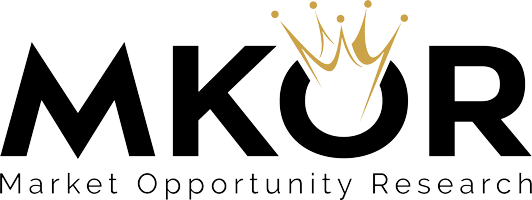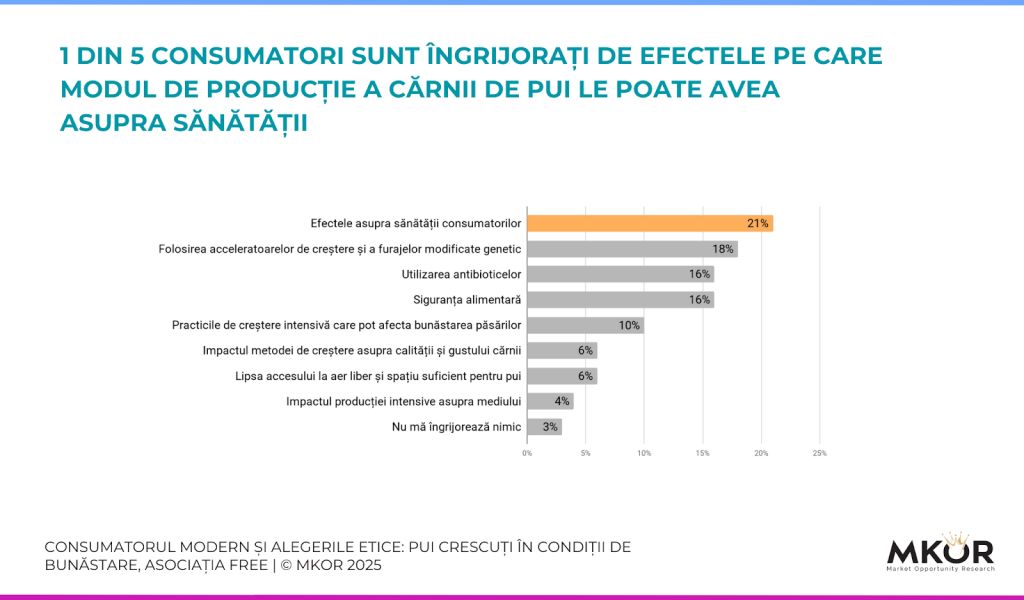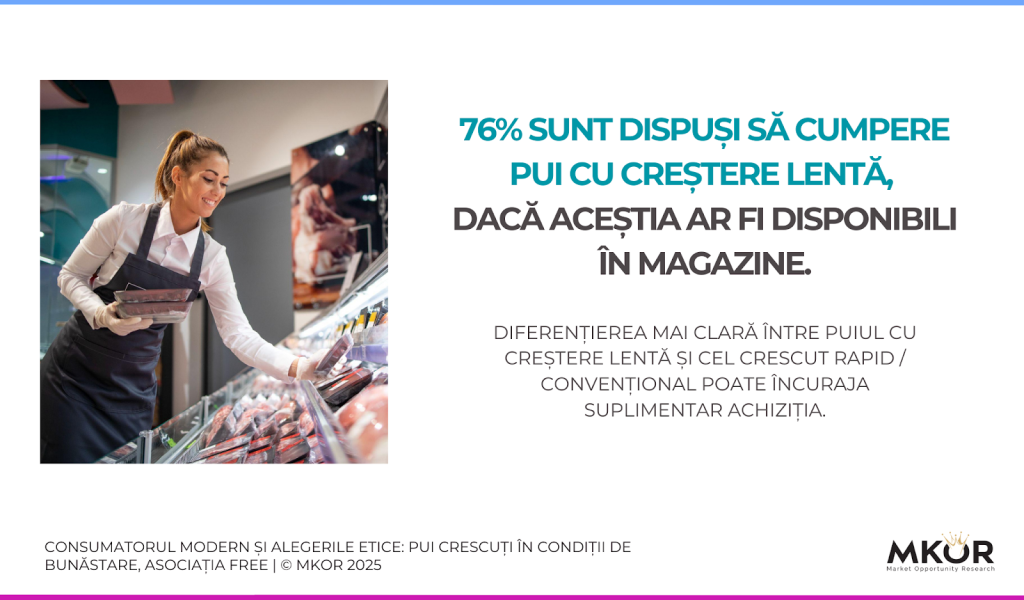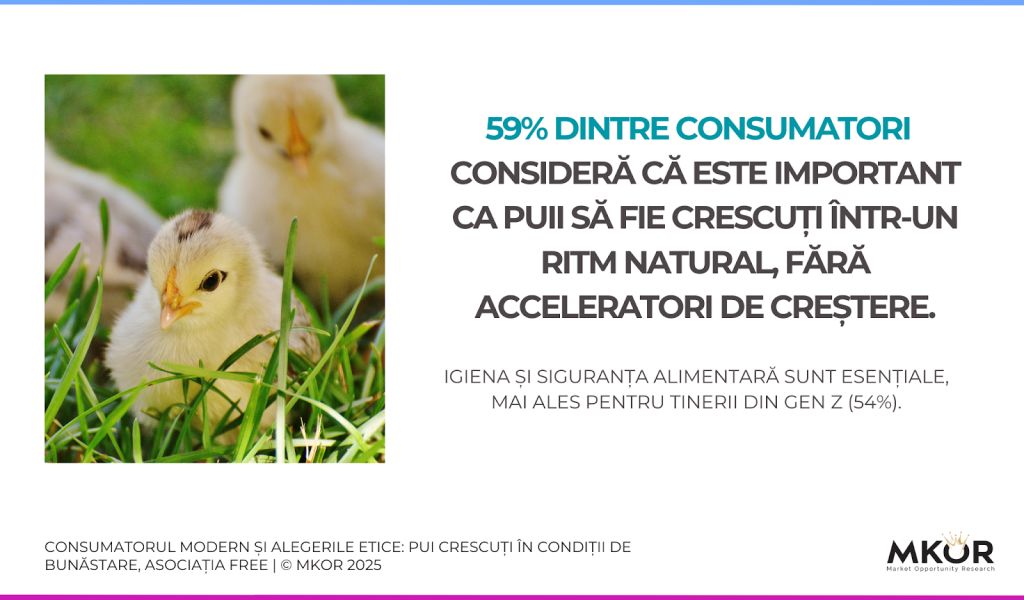„The Modern Consumer and Ethical Choices: Welfare-Friendly Chicken” is a study conducted by the FREE Animals Association, in partnership with MKOR, with the aim of exploring Romanian consumers’ perceptions, behaviors, and expectations regarding chicken meat, product labeling, and animal welfare standards.
The research highlights that, although chicken meat remains a staple in the Romanian diet, consumers are becoming increasingly attentive to the conditions in which chickens are raised, demanding clear and transparent information.
The study showed that over 80% of people consume it monthly, and 51% declare they consume it even more frequently than a year ago.
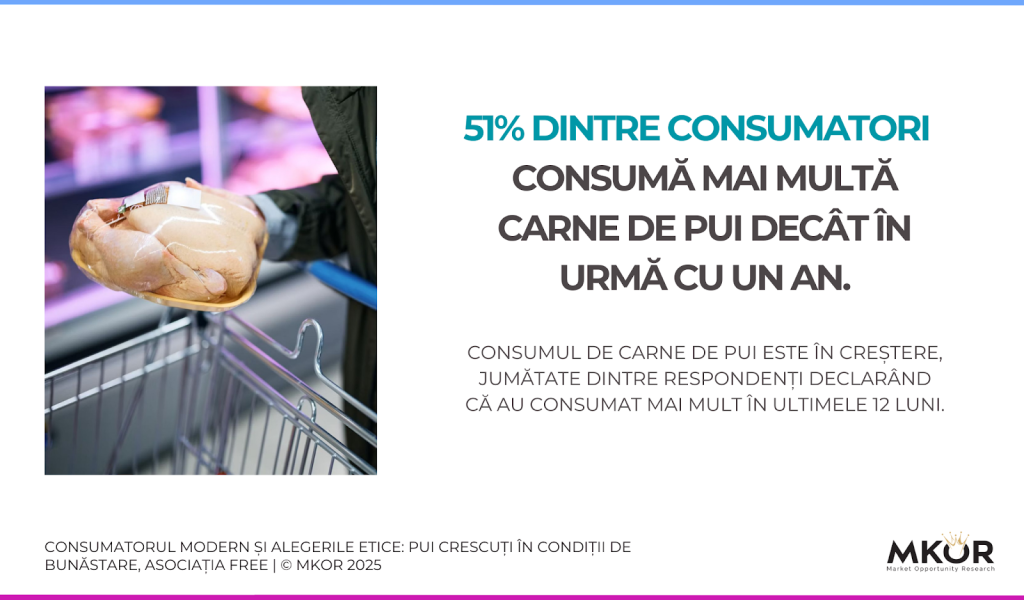
What Romanians Want from Chicken Meat
Romanians want: slow-growing chickens (76%), raised at a natural pace, without growth accelerators (59%), if they had access to this type of product in stores.
95% check the label before buying, but only half believe that the information provided is sufficient to make an informed decision.
Only 12% of people correctly understand what the term „conventional chicken” means. Moreover, 1 in 5 Romanians is concerned about the impact of rearing methods on health.
Lack of standardization and ambiguity of terms on labels contribute to increasing distrust: „natural”, „slow-growing” or „free-range” are perceived differently from one packaging to another.
In the absence of clear information about chicken density in farms, growth speed, or applied treatments, consumers feel they are making choices blindly.
Research Objectives
This study aimed to provide a clear picture of Romanian consumers’ behavior and attitudes regarding chicken meat, with a special focus on their interest in products from responsible sources.
The FREE Association wanted to understand how Romanians consume chicken meat, how often, what types, in what form, and by what methods they prepare it. Together with MKOR, they analyzed purchase behaviors: where they buy most often, how frequently, and under what conditions they choose one product over another.
A central objective of the research was to identify the factors influencing purchasing decisions: what determines the choice of a particular type of chicken (e.g., price, origin, label information), as well as the main barriers that prevent people from choosing responsibly raised products.
This study evaluated the extent to which Romanian consumers are familiar with different types of chicken rearing (from conventional, to slow-growing, or organic) and how well they understand the differences between them.
An important aspect of the analysis focused on concerns regarding industrial production, particularly how large-scale rearing methods influence health, food safety, and animal welfare.
Concurrently, the research explored the genuine interest in slow-growing chicken: how attractive it is to consumers, what is the likelihood of purchasing it, under what conditions they would choose it, and what price range is perceived as fair or acceptable for this type of product.
To complete the overall picture, the research outlines both the demographic profile (age, gender, living environment, income, occupation, education level, family situation) and the consumers’ psychographic profile: what lifestyle they have, what values guide them, and what attitudes they adopt towards diet, health, and sustainability.
4 Benefits of a Perception and Consumer Habits Study
Conducting a market study to analyze consumer perception and consumption habits offers numerous benefits for companies, including:
- Aligning Offer with Real Consumer Expectations. By understanding consumer preferences, values, and behaviors, producers and retailers can adapt their product range, packaging, distribution channels, and marketing messages to directly meet market demand.
- Building Trust and Loyalty for Responsible Brands. This type of market study highlights what generates consumer trust (e.g., label transparency, natural growth rate, local origin), offering organizations the opportunity to build long-term relationships based on transparency and responsibility.
- Informing Business Decisions. The collected data supports making informed decisions regarding product development, investments in more ethical technologies, partnerships with farms, or the certifications needed to remain competitive in a changing market.
- Contributing to Market Education and Shifting Consumer Behavior. By identifying information gaps and frequent misunderstandings (e.g., ambiguous label terms), the study can form the basis for educational campaigns that raise awareness and encourage sustainable choices.
Press Coverage of the Study
The study „The Modern Consumer and Ethical Choices: Welfare-Friendly Chicken” was met with interest by the Romanian press. Among the publications that wrote about this study are:
About the Market Study
For this project, we conducted a mixed study, both quantitative and qualitative, using an online opinion survey and focus groups, applied to our proprietary panel, as data collection instruments.
- Target Market: Romania
- Target Audience: Nationally representative sample, by gender, age, and geographical distribution
- Research Type: quantitative and qualitative
- Research Instrument: Online Survey (CAWI)
About the Client
Freedom And Respect For Every Earthling (FREE) is an association founded in 2017, which fights for improving the conditions in which animals are raised on Romanian farms. The organization carries out projects that combat inhumane practices and promote a plant-based diet.
One of its projects is „No Conventional Chicken”. Through the „No Conventional Chicken” project, the FREE Animals Association aims to reduce the suffering of chickens raised for meat by informing consumers and the industry about real farm conditions and offering more ethical alternatives.
Project objectives include:
- increasing awareness of animal welfare,
- providing clear information about practices in the poultry industry,
- understanding consumer behavior: what kind of chicken meat is purchased, how often, what parts are consumed, and how important the origin and rearing method of chickens are to consumers.
Do you want to understand how consumers choose, buy, and relate to the products your brand offers?
At MKOR, we conduct perception and consumer habits studies that show you how your customers think and act. Stop guessing – find out directly from the source.
With over 12 years of experience in market research in Romania, we are the ideal partner for brands that want to make decisions based on real data, not intuition. We work agilely, adapting our methodology to your needs, so you can quickly get relevant and actionable insights.
What can you learn from a perception and consumer behavior study?
- What consumption patterns your audience has (frequency, occasions, contexts)
- What factors influence the purchase decision (price, label, product origin)
- What unmet expectations, frustrations, and needs consumers have
- How your brand is positioned relative to other market players
We work closely with your team to choose the most suitable research methods – qualitative, quantitative, or mixed – so that the collected data reflects market reality, not just general estimates.
Monthly, we conduct a general Agile Research study and Brand Tracking. By the 15th of each month, you can sign up on our expression of interest list if you wish for us to conduct a micro-study for your business.
What are your advantages?
- Continuous monitoring: you get access to rapid data (even monthly) about the impact of your campaigns and market changes.
- Maximum adaptability: you choose the frequency and measurement indicators that matter for your brand (you have the opportunity to participate in such studies monthly).
- Fast and informed decisions: you optimize your marketing strategy based on concrete data.
Contact us and let’s discover together how you can build a stronger relationship with your customers, starting from what truly matters to them.
Explore our client portfolio and case studies to see how we make a difference.
Because in today’s crowded world, the one who understands the consumer best wins.
